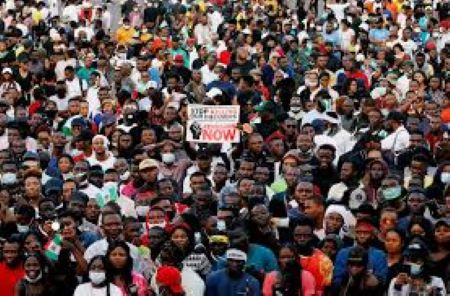Nigeria has a rich history of protests that have significantly shaped the country’s political and social landscape. From pre-independence protests to modern-day demonstrations, Nigerians have consistently used their voices to demand change and justice.
By Usman Mohammed Binji
The Aba Women’s Riot of 1929: One of the most significant protests in Nigeria’s history was the Aba Women’s Riot of 1929. The riot was sparked by the imposition of a new tax on women, which many saw as an attempt by the colonial authorities to undermine traditional Igbo society. Thousands of women took to the streets, chanting and singing, and eventually forced the authorities to back down. This riot is considered a seminal moment in Nigerian history, marking the beginning of women’s involvement in politics and social activism.
The 1945 General Strike: Another notable protest was the 1945 General Strike, a response to the colonial government’s decision to increase the price of imported goods in Nigeria. Organized by labor unions and civil society groups, the strike lasted for several days and was marked by clashes between protesters and security forces. The strike eventually forced the government to reduce the prices of imported goods. This protest demonstrated the growing power of organized labor in Nigeria.
ALSO READ Hunger protest: Why Tinubu can’t alter the 1999 constitution – APC
The Enugu Coalminers’ Strike of 1953: In 1953, the Enugu Coalminers’ Strike protested the poor working conditions and low wages of coal miners in Enugu. Organized by the National Union of Mineworkers, the strike lasted for several months and resulted in the deaths of several miners. However, it eventually forced the government to improve working conditions and increase wages for coal miners, highlighting the influence of labor unions in Nigeria.
The Tiv Riots of 1962: The Tiv Riots of 1962 were a series of protests against the imposition of taxes on farmers in northern Nigeria. Marked by violent clashes between protesters and security forces, the riots lasted for several months and resulted in hundreds of deaths. These riots underscored the growing tensions between different ethnic groups in Nigeria.
The Ali Must Go Protest of 1977: The Ali Must Go protest in 1977 was a student-led demonstration against the government’s decision to increase tuition fees in Nigerian universities. Named after the Minister of Education at the time, Col. Ahmadu Ali, the protest led to the closure of all Nigerian universities for several months. Although the government eventually reduced the tuition fees, the protest had already left a lasting impact on Nigeria’s political landscape.
ALSO READ Let’s Celebrate Tinubu Over LG Autonomy, Not Protest – Adamawa APC
The Fuel Price Protests of 2012: In 2012, protests erupted in response to the government’s decision to increase fuel prices. Organized by labor unions and civil society groups, the protests lasted for several days and were marked by clashes with security forces. The government eventually reduced the fuel prices, but the protests highlighted the growing discontent among Nigerians over the state of the economy and perceived government corruption.
The #EndSARS Protest of 2020: More recently, the #EndSARS protest of 2020 was a response to police brutality and extrajudicial killings by the Special Anti-Robbery Squad (SARS) of the Nigerian police. Organized by young Nigerians on social media, the protest lasted for several weeks and included peaceful demonstrations and clashes with security forces. The protest led to the disbandment of SARS and raised important questions about police reform and accountability in Nigeria.
On a final note, protests have been a crucial tool for Nigerians to demand change from their leaders throughout the country’s history. Despite often being met with violence and repression, these protests have led to significant social and political changes. The legacy of these protests continues to inspire activism and social justice movements in Nigeria today.


